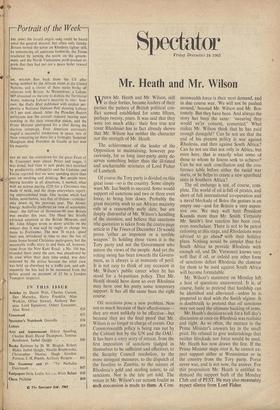Mr. Heath and Mr. Wilson
Wi{EN. Mr. Heath and Mr. Wilson, still n their forties, became leaders of their parties the pattern of British political con- flict seemed established for some fifteen, perhaps twenty, years. It was said that they were too much alike : their first true test (over Rhodesia) has in fact already shown that Mr. Wilson has neither the character nor the strength of Mr. Heath.
The achievement of the leader of the Opposition in maintaining, however pre- cariously, fdr so long inter-party unity de- serves something better than the ill-timed and uncharitable strictures of Lord Fisher of Lambeth.
Of course the Tory party is divided on this great issue—so is the country. Some simply want Mr. Ian Smith to succeed. Some would support oil sanctions and two or three even force, to bring him down. Probably the great majority wish to see African majority rule at a reasonably early date, but are deeply distrustful of Mr. Wilson's handling of the situation, and believe that sanctions (the quotation is taken from the centre-page article in The Times of December 15) would prove 'either an impotent or a terrible weapon.' In holding these views it is the Tory party and not the Government who mirror the views of the people. And yet the voting swing has been towards the Govern- ment, as it always is at moments of peril. It is not easy to think of any occasion in Mr. Wilson's public career when he has stood for a bi-partisan policy. That Mr. Heath- should have done so over Rhodesia may have cost his party some temporary support. It has all the same been the right course.
Oil sanctions pose a new problem. New not so much because of their effectiveness— they are most unlikely to be effective—but because they are the final proof that Mr. Wilson is no long& in charge of events. Our Commonwealth policy is being run not by the Cabinet but by the UN and the OAU. It has been a sorry story of retreat, from the first imposition of sanctions (judged in themselves to be sufficient and effective), to the Security Council resolution, to the more stringent measures, to the dispatch of the Javelins to Zambia, to the seizure of Rhodesia's gold and sterling assets, to oil sanctions. Nor is the tale yet told. The voices in Mr. Wilson's ear scream louder as each concession is made to them. A Corn- monwealth force is their next demand, and in due course war. 'We will not be pushed around,' boasted Mr. Wilson and Mr. Bot- tomely. But they have been. And always the story has been the same : 'swearing they would ne'er consent, consented.' What makes Mr. Wilson think that he has paid enough danegeld? Can he not see that the end of his present policy is war against Rhodesia, and then against South Africa? Can he not see that not only in Africa, but even here, that is exactly what some of those to whom he listens seek to achieve? Can he not seek conciliation and the con- ference table before either the racial war starts, or he helps to create a new apartheid state in Southern Africa?
The oil embargo is not, of course, com- plete. The world of oil is full of pirates, and short of full international co-operation and 'a naval blockade of Beira the gesture is an empty one—and for Britain a very expen- sive one. We may well hurt President Kaunda more than Mr. Smith. Certainly Mr. Smith's first reaction has been cool, even nonchalant. There is not to be petrol rationing at this stage, and Rhodesians were advised to go ahead' with their holiday plans. Nothing would be simpler than for South Africa to provide Rhodesia with enough oil, and Dr. Verwoerd knows very well that if oil, or indeed any other form of sanctions defeat Rhodesia the clamour for them to be used against South Africa will become formidable.
Mr. Wilson's statement on Monday left a host of questions unanswered. , It is, of course, futile to pretend that hardship can be identified and alleviated—unless he is prepai.ed to deal with the Smith regime. It is doubletalk to pretend that oil sanctions may not need the ultimate backing of arms.
Mr. Heath's decision to ask fora full day's discussion at once on Rhodesia was realistic and right. AS so often, the menace in the Prime MThister's answers lay in the small print. He refused to give undertakings that neither blockade nor force would be used. Mr. Heath has now drawn the line. If the Prime Minister steps over it, he cannot ex- pect support either at Westminster or in the country from the Tory party. Force never was, and is not now, the answer. For this proposition Mr. Heath is entitled to demand the support both of the Monday Club and of PEST. He may also reasonably expect silence from Lord Fisher.






























 Previous page
Previous page